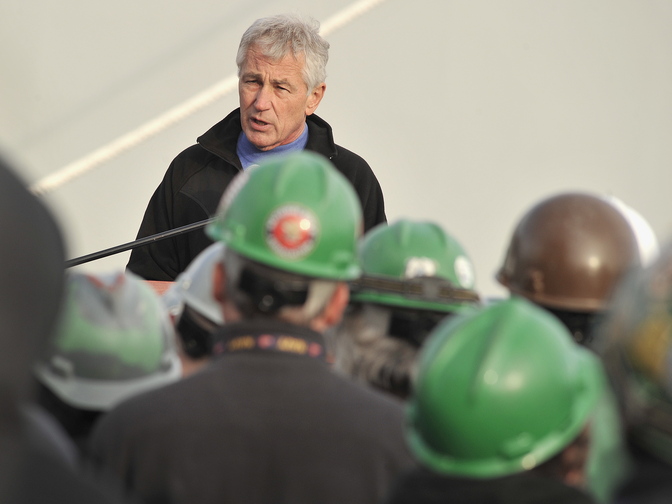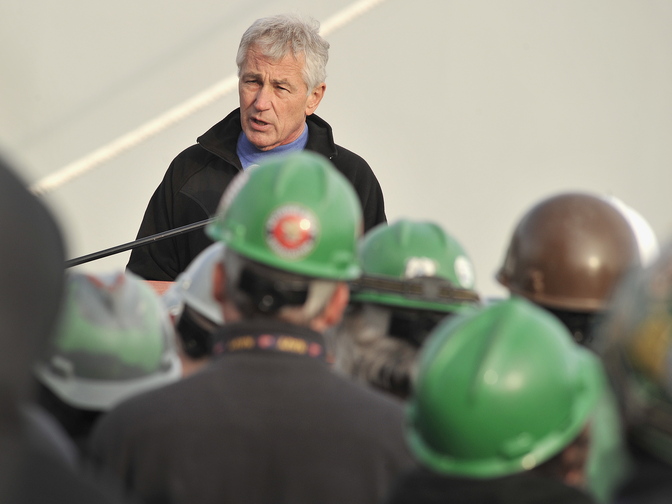BATH — Defense Secretary Chuck Hagel was just a speck against the massive gray hull of the $3.5 billion DDG-1000, the “stealth destroyer,” the first of its kind and the largest destroyer ever built for the U.S. Navy.
Hagel’s remarks to the workers and military personnel at Bath Iron Works on Thursday were short. Behind him, the 610-foot USS Zumwalt was huge. Its first scheduled deployment, the Asian Pacific, is even bigger.
Hagel said the destroyer’s destination is significant, representing a shift in the country’s geopolitical interests. The United States isn’t “retreating from any part of the world,” he said.
“We’ve always had threats and we’ve met the challenges,” he said. “But this is a new time.”
Hagel’s remarks were delivered a day after Susan Rice, President Obama’s national security adviser, announced that the president will travel to Asia in April.
According to a news release from the Department of Defense, the United States plans to continue using its “influence, diplomacy, economic might and power to provide a safe and secure region where countries in the Asia-Pacific can thrive.”
“Ultimately, America’s purpose is to establish a more stable security environment in Asia, an open and transparent economic environment and a liberal political environment that respects the universal rights and freedoms of all,” Rice said.
“By 2020, 60 percent of our fleet will be based in the Pacific and our Pacific Command will gain more of our most cutting-edge capabilities,” she said.
It’s a new time in the defense world, and in Congress, which Hagel referred to while noting that funding that made construction of the Zumwalt possible is creating uncertainty and challenges for defense projects.
The issue was on the minds of the BIW employees Thursday. The shipyard is putting the finishing touches on the USS Zumwalt, which is designed to elude enemy radar.
BIW, a major contractor for the Navy and one of Maine’s largest private employers with more than 5,000 workers, has been the subject of recent news coverage.
Much of the attention has centered on the Zumwalt, the product of a 20-year project that will cost taxpayers $21.5 billion for three ships. The price includes an estimated $7.16 billion in research and development costs that delayed the DDG-1000 project, originally expected to cost $35.8 billion for 32 ships, according to a recent analysis by Lawrence Korb at the Center for American Progress.
Some in Bath have questioned whether BIW, a subsidiary of General Dynamics, should get a $3.7 million tax break from the city. On Wednesday, the Bath City Council approved the rebate, reduced from the original proposal of $6.3 million.
BIW planned to lay off 39 pipe fitters as of Monday, but there may be good news coming for the laid-off workers.
On Wednesday, Reuters reported that BIW is in the running for a multibillion-dollar contract with the Saudi Arabian government to expand its naval fleet. The Saudis are considering two ship designs, including the DDG-51, the Arleigh Burke-class destroyer, also built by BIW.
All that news preceded Hagel’s tour of the Zumwalt, which was lowered into the Kennebec River on Oct. 28.
Hagel didn’t take questions from the media, but he fielded a few from workers. Nearly all of them were about the shipyard’s future, a constant source of uncertainty for a business that reported it spent $67 million doing business with 355 Maine companies in 2012.
BIW has made close to 440 Navy and commercial ships since 1884. When a worker asked Hagel if he believes that the shipyard will remain a vital cog in the country’s defense complex, he replied, “The answer is a resounding yes.”
BIW launched the Zumwalt so workers could test the engines and other systems and complete the final 15 percent of work on the ship. A christening ceremony was canceled last month because of the federal government shutdown.
BIW has contracts for two more DDG-1000s and is building two DDG-51 Arleigh Burke-class destroyers.
The shipyard has $2.8 billion in contracts to build at least four more Arleigh Burke destroyers through fiscal year 2017, with the possibility of a fifth ship if Congress awards additional funding.
Steve Mistler can be contacted at 791-6345 or at:
smistler@pressherald.com
Twitter: @stevemistler
Send questions/comments to the editors.




Comments are no longer available on this story